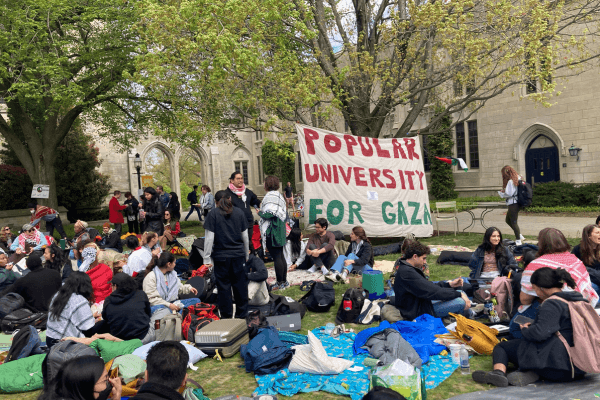Rachael Clinton Chen believes that we are seeing “an apocalyptic unveiling” of abuse committed by faith leaders.
And it’s not hard to see why: In the past decade, a slew of once-revered Christian leaders have been exposed for sexual violence or sexual misconduct: Ravi Zacharias, Bill Hybels, Jean Vanier, former Cardinal Theodore McCarrick, and too many others to name. But as director of teaching and care at The Allender Center, which offers care and training to help people heal from trauma, Chen knows that abuse has many forms. And when sexual violence is committed by a faith leader, it’s often accompanied by another form of violence that’s harder to define: spiritual abuse.
Spiritual abuse is “a distortion and exploitation of spiritual authority to manipulate, control, use, or harm others, mostly through shame and fear,” Chen told me in January 2023 during our conversation for Sojourners’ Lead Us Not podcast. “It’s using vulnerability — it’s using really good things to exploit.”
Later, via email, Chen told me that warning signs of spiritual abuse include intolerance for questions and doubts, using the Bible to arouse fear and rigid “us vs. them” binaries, and leaders who demand unwavering loyalty, often threatening anyone who doesn’t comply with being cut off from the community or God. Spiritual abuse can also look like a leader who offers above-and-beyond care, but in ways that cross ethical, emotional, or spiritual boundaries.
This type of trauma, Chen wrote, often leaves victims “with traumatized bodies, disordered imagination, and broken relationships, making the path to healing all the more challenging but certainly not impossible.”
I included excerpts of my interview with Chen in episodes four and five of Lead Us Not, but the full conversation explored key questions about spiritual abuse, including how we can recognize and heal from it at both an individual and communal level.
“It’s actually a really scary moment,” she told me. “Because it’s one thing if you have an experience of spiritual abuse or sexual abuse, it’s another thing when you start to see, ‘Oh my gosh, this is a whole pattern of behavior. It’s in the water … It’s not just a person or one institution. There’s something about the structures and about the ways in which we give power and empower certain spiritual authorities.’”
The interview has been edited for length and clarity.
Jenna Barnett, Sojourners: How would you define spiritual abuse?
Rachael Clinton Chen: To me, it’s a distortion and exploitation of spiritual authority to manipulate, control, use, or harm others, mostly through shame and fear. It’s using vulnerability to exploit.
Spiritual abuse is always a distortion and exploitation of God’s power … That’s what’s often so shattering about spiritual abuse, is it really cuts you off — not only from your sense of self, but your sense of self in relationship to God. Because these leaders don’t just represent a human; to us they are conduits of God, for better or for worse.
What is something that survivors/victims need to heal in the wake of spiritual abuse, especially when it’s sexual abuse that’s happened in a spiritually abusive way?
Some sense of justice. An experience of God being on their side. Sometimes that justice looks like engaging with our legal systems and structures. Sometimes it looks like someone being removed from leadership positions. A sense of accountability is a core part of a movement toward justice. Truth-telling is also part of the restorative process. Can there be compensation and reparations? People need to know that something will be made right. We need to know something of God’s justice — something of God’s mercy — in the land of the living.
Vulnerability, especially in faith communities, can be a meaningful way to establish deep human connection. But spiritual abuse shows there’s a flipside to encouraging vulnerability. What role does vulnerability play in spiritual abuse?
I think that connection to vulnerability is, to me, what is part of the wicked nature of spiritual abuse as it connects to sexual abuse, because grooming is a huge part of both forms of abuse. It’s an attunement without containment. It’s a capacity to read and see another person really well — to not only see their vulnerability, but to invite it, to set a table that creates a fantasy of safety.
Jesus’ fury is really reserved for the religious leaders who are exploiting their religious authority — those of us with skills to set the table for vulnerability: good therapists, good pastors, good spiritual leaders. I don’t see many places where Jesus gets furious and actually says language like, “Woe to you! It would be better for you to have a millstone around your neck and cast into a lake than to cause one of these little ones to stumble.” Which, basically, like, you should be brutally killed. If you have access to someone’s innocence, their vulnerability, their formation, and you exploit that, Jesus has some pretty powerful things to say about it.
Have you ever worked in situations where people are having to recover from spiritual abuse when the abuser is no longer around or has died?
It’s kind of a fallacy that we can only heal if we can contend with the person who harmed us. And that is the ideal, but it’s not always safe to do that. And not everyone [who harms] is actually capable of true repentance.
I think we sometimes think of restored relationship as the end all be all. And sometimes, that’s not. Sometimes it’s actually, “I don’t ever wanna be in a relationship with you again.” I see this often: People have to continue a healing journey even when the person who harmed them is no longer here to speak for themselves, to give more insight as to why they did what they did. Because when we’ve experienced harm, we’re always wanting to understand how someone could do this. And I think the hardest part is sometimes having to accept: We may never know. And even if we did know, it would not make it feel any better. Sometimes it might make it feel less terrifying and sometimes it makes it feel more terrifying.
In addition to therapy, are there other practices you would recommend for healing from spiritual abuse?
You know, as cheesy as this sounds, [I’d recommend] rituals of letter writing. Invite a small group of people who you trust and know, and write almost like a witness statement, as if you were gonna go to a court of law — a victim impact statement in some ways.
And there might need to be multiple iterations of that. Because the truth is there’s always the harm that played out, but then there’s the debris that has to be contended with, right? So, the impact isn’t just, “You did this thing and here’s what it did [to me].” It’s, “You did this thing and now I have trouble sleeping and I’ve struggled to connect in community, and I don’t trust people in power, and I’m dealing with autoimmune disorders.”
There is something powerful when others — who are trustworthy and who suffer with us — bear witness to the harm we’ve experienced and don’t just say, “It’s not your fault,” or, “You’ll get through this,” or “God’s gonna turn this around,” but who move toward us, and who offer a kind face to us in places where we actually bear tremendous shame.
When I’m working with people who’ve experienced this kind of harm, sometimes I say, “Hey, it’s okay if we gotta put the spiritual language aside for a season, if we’ve gotta set down some of these former practices that have deeply shaped you.” It doesn’t mean we’re setting them down indefinitely… [These practices] may come back to us in a resurrected form. I believe in a God who brings beauty out of our ashes and who has promised to make things new, but we know in trauma studies that newness is not without evidence of the wound.
I’m struck by what you said about things coming back in a resurrected way — and it may not look the same. And I think about the resurrection story when Mary Magdalene saw Jesus in the garden and didn’t recognize him. Even Jesus, when he came back resurrected, he must have been different, felt different, looked different.
You’re right — that sense that Jesus didn’t look the same. I don’t think any of us look the same on the other side of a recovery process, of a healing process. What feels tragic to me is when the harm has the capacity to steal and to destroy things that are actually precious to us. Sometimes, it takes time to be able to go, “What actually will need to die indefinitely and what might be able to be recovered and come with me?”
I want to talk about what I’ve come to think of as the shrapnel of spiritual trauma — there are the victims who experienced this abuse directly, and then there are the other community members [who might be thinking], If this spiritual abuse didn’t directly happen to me, why am I feeling so sad about it? What do we call that? Is that spiritual abuse?
Just because that abusive experience didn’t happen to you, the spiritual leadership did, whether it’s from afar or in proximity. So, when there is this kind of harm playing out, it doesn’t matter if you weren’t harmed in some of these specific ways; you were still harmed spiritually. And that is the debris and shrapnel of spiritual abuse when it’s coming from such a prominent leader. Because the ramifications are so vast and so pervasive and are kind of like a tsunami that can just take out. So yes, it is spiritual abuse. It’s a spiritually abusive experience. Even if you could say like,“This person didn’t know me from Adam; I’ve just been reading their stuff and following them.” It may not be the same volume as someone who was at the epicenter, but it’s never helpful to get into the “trauma Olympics.”
Have you ever worked with a community that’s coming to terms with a founder or charismatic leader who turned out to be abusive?
Yes, I have done work with communities that are dealing with the fallout of a spiritually abusive leader. It’s such a dynamic process because you’re dealing with questions like, “ How did we not see this? Why did we give our power away? Why did we let this become a part of our culture?”You’re helping people make sense of what happened, even though most times it will never make sense in a way that we can metabolize fully.
But you’re helping people see what actually played out so that they feel less confused, and you’re helping them name the impact on their own hearts and bodies and minds. And then hopefully healing is possible, both individually and corporately.
Have you had moments where you felt like, ‘Ok, that was a breakthrough. That’s a little taste of what healing looks like’?
In any shattering of relationship or trust, there almost needs to be a funeral. [The community needs] to come together and utter something of the heartache and the rage. That is when I know a community will continue on together — even if in a diaspora. Healing will be possible … There’s fragmentation and heartache and fear, but you encounter the people who say, “This was one of the most brutal things I’ve experienced. But I’m not quite ready to throw in the towel on everything. I still am tasting something of the goodness of God in the land of the living.”
Got something to say about what you're reading? We value your feedback!








